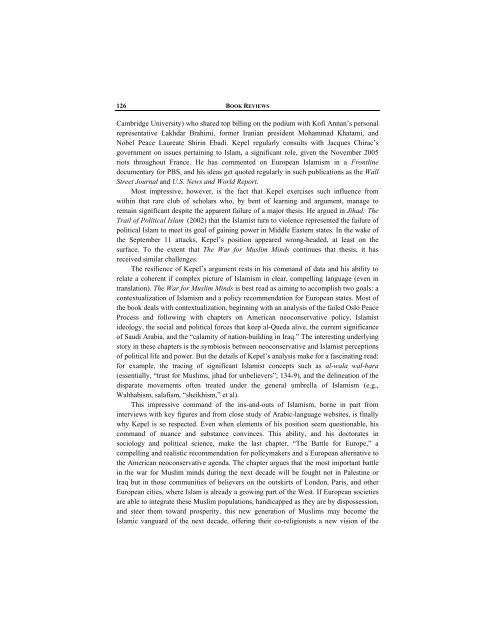Gillian Clark, Christianity and Roman Society - Huntington University
Gillian Clark, Christianity and Roman Society - Huntington University
Gillian Clark, Christianity and Roman Society - Huntington University
Create successful ePaper yourself
Turn your PDF publications into a flip-book with our unique Google optimized e-Paper software.
126 BOOK REVIEWS<br />
Cambridge <strong>University</strong>) who shared top billing on the podium with Kofi Annan’s personal<br />
representative Lakhdar Brahimi, former Iranian president Mohammad Khatami, <strong>and</strong><br />
Nobel Peace Laureate Shirin Ebadi. Kepel regularly consults with Jacques Chirac’s<br />
government on issues pertaining to Islam, a significant role, given the November 2005<br />
riots throughout France. He has commented on European Islamism in a Frontline<br />
documentary for PBS, <strong>and</strong> his ideas get quoted regularly in such publications as the Wall<br />
Street Journal <strong>and</strong> U.S. News <strong>and</strong> World Report.<br />
Most impressive, however, is the fact that Kepel exercises such influence from<br />
within that rare club of scholars who, by bent of learning <strong>and</strong> argument, manage to<br />
remain significant despite the apparent failure of a major thesis. He argued in Jihad: The<br />
Trail of Political Islam (2002) that the Islamist turn to violence represented the failure of<br />
political Islam to meet its goal of gaining power in Middle Eastern states. In the wake of<br />
the September 11 attacks, Kepel’s position appeared wrong-headed, at least on the<br />
surface. To the extent that The War for Muslim Minds continues that thesis, it has<br />
received similar challenges.<br />
The resilience of Kepel’s argument rests in his comm<strong>and</strong> of data <strong>and</strong> his ability to<br />
relate a coherent if complex picture of Islamism in clear, compelling language (even in<br />
translation). The War for Muslim Minds is best read as aiming to accomplish two goals: a<br />
contextualization of Islamism <strong>and</strong> a policy recommendation for European states. Most of<br />
the book deals with contextualization, beginning with an analysis of the failed Oslo Peace<br />
Process <strong>and</strong> following with chapters on American neoconservative policy, Islamist<br />
ideology, the social <strong>and</strong> political forces that keep al-Queda alive, the current significance<br />
of Saudi Arabia, <strong>and</strong> the “calamity of nation-building in Iraq.” The interesting underlying<br />
story in these chapters is the symbiosis between neoconservative <strong>and</strong> Islamist perceptions<br />
of political life <strong>and</strong> power. But the details of Kepel’s analysis make for a fascinating read:<br />
for example, the tracing of significant Islamist concepts such as al-wala wal-bara<br />
(essentially, “trust for Muslims, jihad for unbelievers”; 134-9), <strong>and</strong> the delineation of the<br />
disparate movements often treated under the general umbrella of Islamism (e.g.,<br />
Wahhabism, salafism, “sheikhism,” et al).<br />
This impressive comm<strong>and</strong> of the ins-<strong>and</strong>-outs of Islamism, borne in part from<br />
interviews with key figures <strong>and</strong> from close study of Arabic-language websites, is finally<br />
why Kepel is so respected. Even when elements of his position seem questionable, his<br />
comm<strong>and</strong> of nuance <strong>and</strong> substance convinces. This ability, <strong>and</strong> his doctorates in<br />
sociology <strong>and</strong> political science, make the last chapter, “The Battle for Europe,” a<br />
compelling <strong>and</strong> realistic recommendation for policymakers <strong>and</strong> a European alternative to<br />
the American neoconservative agenda. The chapter argues that the most important battle<br />
in the war for Muslim minds during the next decade will be fought not in Palestine or<br />
Iraq but in those communities of believers on the outskirts of London, Paris, <strong>and</strong> other<br />
European cities, where Islam is already a growing part of the West. If European societies<br />
are able to integrate these Muslim populations, h<strong>and</strong>icapped as they are by dispossession,<br />
<strong>and</strong> steer them toward prosperity, this new generation of Muslims may become the<br />
Islamic vanguard of the next decade, offering their co-religionists a new vision of the
















